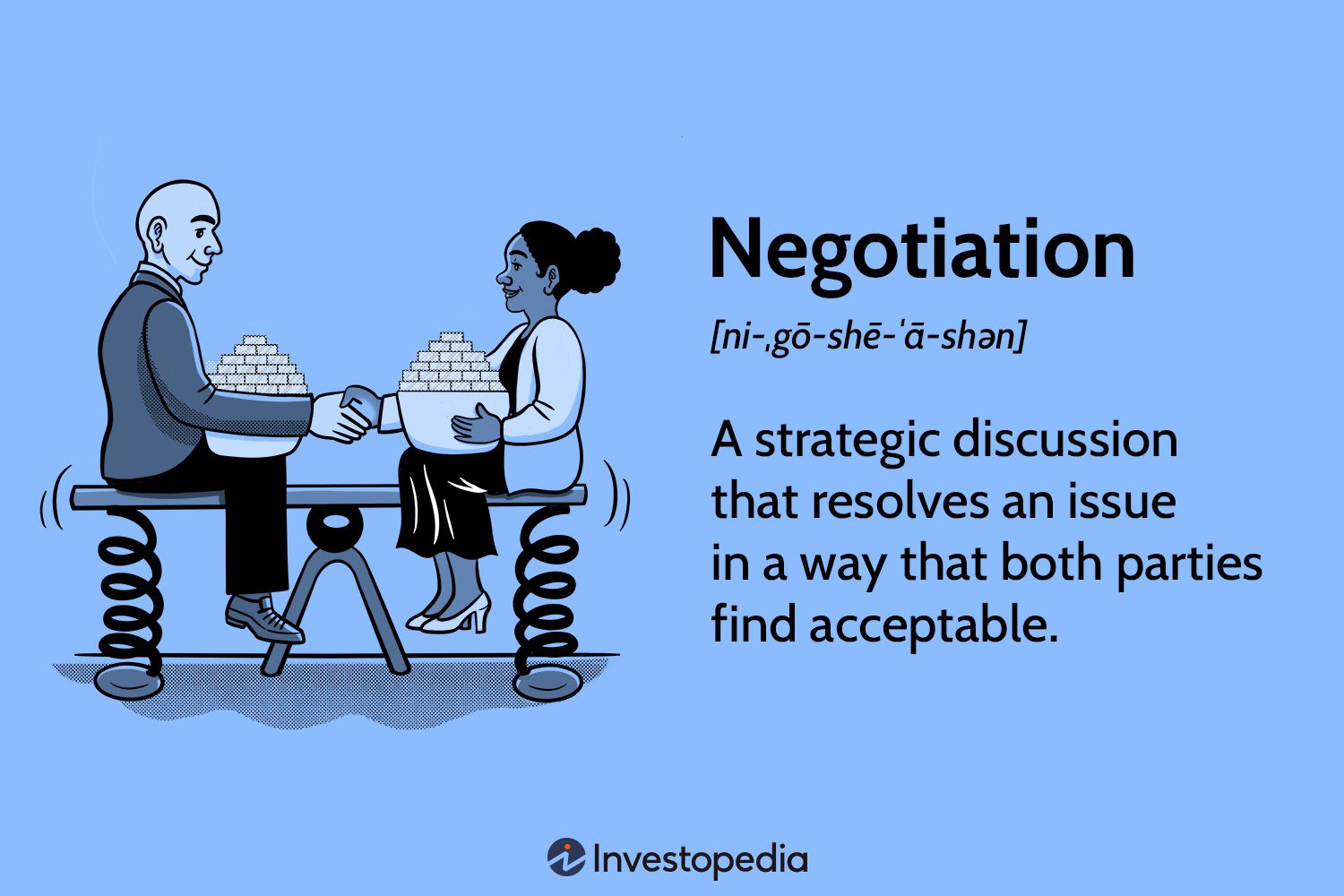The art of negotiation is crucial for personal and professional success. Effective negotiation skills can lead to better deals and stronger relationships.
Mastering negotiation requires understanding key tactics and skills. Clear communication, active listening, and emotional intelligence are essential. Knowing your goals and researching the other party’s interests can give you a significant advantage. Building rapport and trust is crucial for a successful negotiation.
Confidence and patience play vital roles in reaching a favorable outcome. Practice and experience help refine these skills over time. Effective negotiators adapt to different situations and personalities. These skills are not just for business; they benefit everyday interactions too. Enhance your negotiation abilities to achieve better results in various aspects of life.

Credit: www.artofmanliness.com
Introduction To Negotiation
Negotiation is a vital skill in everyday life. It helps us reach agreements and resolve conflicts. Learning negotiation can improve personal and professional relationships. This post will guide you through the basics of negotiation.
Why Negotiation Matters
Negotiation helps solve problems. It lets people find common ground. Everyone can benefit from good negotiation skills. Here are some reasons why negotiation matters:
- Builds better relationships: Negotiation helps create mutual respect.
- Saves time and money: Good deals save resources.
- Improves decision making: Negotiation leads to better choices.
Everyday Negotiations
Negotiation is not just for big business deals. We use it daily without noticing. Here are some common examples:
| Scenario | Negotiation Example |
|---|---|
| At work | Discussing project deadlines |
| At home | Deciding on chores |
| Shopping | Asking for a discount |
These examples show how often we negotiate. Improving negotiation skills can make life smoother.
Key Skills For Effective Negotiation
Successful negotiation relies on mastering several key skills. These skills help you reach a mutually beneficial agreement. Understanding and practicing these skills can elevate your negotiation game.
Active Listening
Active listening is more than just hearing words. It’s about fully understanding the speaker’s message. This skill involves giving your full attention to the speaker. Avoid distractions and show that you are engaged. Nod your head or give verbal affirmations like “I see” or “Go on”.
- Maintain eye contact
- Ask clarifying questions
- Summarize their points to confirm understanding
By actively listening, you can better understand the other party’s needs. This helps in finding common ground.
Emotional Intelligence
Emotional intelligence is the ability to understand and manage your own emotions. It also involves recognizing and influencing the emotions of others. High emotional intelligence can improve your negotiation outcomes.
- Stay calm under pressure
- Read non-verbal cues
- Respond rather than react
Being emotionally intelligent helps you build rapport and trust. This makes the other party more likely to agree with you.
Building Rapport
Building rapport is essential in the art of negotiation. It creates a foundation of trust and mutual respect. Knowing how to build rapport can lead to successful agreements and lasting relationships.
Establishing Trust
Trust is the cornerstone of any negotiation. Without trust, progress is difficult.
Here are some ways to establish trust:
- Be Honest: Always tell the truth. Honesty builds credibility.
- Active Listening: Pay attention to the other person’s words.
- Show Empathy: Understand and share the feelings of others.
- Consistency: Be reliable and consistent in your actions.
Finding Common Ground
Finding common ground helps to create a connection between parties. It shows that you share similar interests or goals.
Ways to find common ground include:
- Shared Interests: Discuss hobbies or interests you both enjoy.
- Mutual Goals: Focus on the goals that benefit both sides.
- Similar Experiences: Share past experiences that are relatable.
By following these steps, you can build a strong rapport. This will enhance your negotiation skills and lead to successful outcomes.
Preparation Techniques
Mastering the art of negotiation starts with thorough preparation. Successful negotiators spend significant time preparing before any discussion. This section will guide you through key preparation techniques that can help you become a better negotiator.
Research And Information Gathering
Gathering information is the first step in effective negotiation. Knowing your facts gives you a strong foundation. Here are some tips for effective information gathering:
- Understand the other party: Research their background, interests, and needs.
- Know the market: Understand the current trends and prices.
- Identify key players: Find out who makes the decisions.
- Prepare questions: List questions to ask during the negotiation.
A well-informed negotiator can better anticipate challenges. This knowledge helps in crafting a strategy that aligns with both parties’ interests.
Setting Clear Goals
Setting clear goals is crucial for successful negotiation. Goals provide direction and keep you focused. Here are some steps to set effective goals:
| Step | Action |
|---|---|
| 1 | Define your objectives: Know what you want to achieve. |
| 2 | Prioritize: Rank your goals in order of importance. |
| 3 | Set benchmarks: Determine acceptable outcomes and walk-away points. |
| 4 | Visualize success: Picture the ideal outcome. |
Clear goals help you stay focused during negotiations. They keep you from getting sidetracked. This focus can lead to more successful outcomes.
Communication Strategies
Effective communication is key to successful negotiation. Mastering both verbal and non-verbal cues can make a huge difference. Understanding how to frame your arguments can sway outcomes in your favor. Let’s dive into these essential communication strategies.
Verbal And Non-verbal Cues
Words matter, but so does body language. Pay attention to both.
- Active Listening: Show you are listening. Nod and give verbal affirmations.
- Eye Contact: Maintain eye contact. It builds trust.
- Posture: Stand or sit up straight. It shows confidence.
- Voice Tone: Keep your voice calm and steady. Avoid sounding aggressive.
Non-verbal cues can often speak louder than words. Always be mindful of your body language.
Framing Your Arguments
How you present your arguments is crucial. Framing can influence perception.
- State Your Position Clearly: Be direct. Avoid ambiguity.
- Use Data and Facts: Support your points with evidence. Facts are hard to refute.
- Appeal to Interests: Understand the other party’s needs. Align your arguments with their interests.
- Be Positive: Frame your arguments positively. Avoid negative language.
Effective framing can make even difficult arguments more acceptable. Always aim to be clear and positive.
Dealing With Difficult Situations
Negotiation often involves challenging scenarios. Mastering the art of handling these situations is crucial. This skill helps you stay calm and achieve your goals. Below are essential techniques for managing conflict and handling objections.
Managing Conflict
Conflict is common during negotiations. The key is to stay calm. Listen actively to the other person’s concerns. Make sure you understand their point of view. This shows respect and can diffuse tension.
- Stay calm: Keep your emotions in check.
- Listen actively: Show that you value their opinions.
- Seek common ground: Find areas where you agree.
Use I statements instead of blaming. For example, say “I feel concerned” rather than “You are wrong.” This approach reduces defensiveness and opens up dialogue.
Handling Objections
Objections can arise during any negotiation. Addressing them effectively is key. Anticipate common objections and prepare responses in advance. This shows you are well-prepared and confident.
- Understand the objection: Ask clarifying questions.
- Acknowledge their concerns: Show empathy and understanding.
- Respond with facts: Provide clear, concise answers.
Present your response confidently. If unsure, take a moment to think. It’s better to pause than to give a weak answer.
| Tip | Action |
|---|---|
| Stay Calm | Take deep breaths and keep your tone steady. |
| Listen Actively | Nod and make eye contact. |
| Respond Confidently | Use facts and stay composed. |
By mastering these techniques, you can handle difficult situations in any negotiation. These skills are essential for achieving successful outcomes.
Closing The Deal
Mastering the art of negotiation is not complete without closing the deal. This crucial step ensures both parties are satisfied. It’s where agreements turn into commitments. Let’s explore two key aspects: reaching an agreement and confirming terms.
Reaching An Agreement
Reaching an agreement requires clear communication and mutual understanding. Both parties need to feel heard. Use simple language to avoid confusion. Ensure all points are discussed and agreed upon.
- Listen actively to the other party.
- Clarify any doubts immediately.
- Summarize points regularly.
Breaking down complex terms into simpler parts helps both sides. This makes it easier to reach a common ground. Always aim for a win-win outcome.
Confirming Terms
Confirming terms is the next vital step. This ensures that both parties understand their obligations. Clearly outline the terms discussed.
| Term | Details |
|---|---|
| Payment | Amount, method, and due date |
| Delivery | Date, location, and method |
| Responsibilities | Tasks for each party |
Confirm all details in writing. This prevents misunderstandings later. Both parties should review and agree on the final document.
- Draft the agreement document.
- Review the document together.
- Make necessary changes.
- Get signatures from both parties.
Closing the deal effectively is a crucial skill. It ensures all efforts in negotiation are fruitful. By mastering these steps, you can secure successful outcomes.

Credit: www.amazon.com
Post-negotiation Steps
Understanding the post-negotiation steps is crucial for long-term success. These steps ensure the agreement is beneficial and maintain relationships. Let’s explore these steps in detail.
Reviewing The Process
After a negotiation, take time to review the process. Reflect on what went well and areas of improvement. This helps in learning from the experience.
- Document Key Points: Write down the main agreements and decisions.
- Analyze Performance: Evaluate your performance and strategies.
- Feedback: Seek feedback from colleagues or mentors.
Building Long-term Relationships
Building long-term relationships is essential after a negotiation. These relationships can lead to future opportunities and collaborations.
| Action | Purpose |
|---|---|
| Follow-Up | Send a thank you note or email. |
| Stay Connected | Maintain regular communication. |
| Show Appreciation | Express gratitude for the partnership. |
Use these steps to nurture and grow valuable connections.

Credit: www.betterup.com
Conclusion
Mastering negotiation skills can transform your personal and professional life. Effective communication is key. Practice active listening and empathy. Be prepared and stay confident. With time and effort, anyone can become a skilled negotiator. Start honing your negotiation abilities today to unlock countless opportunities and success.

